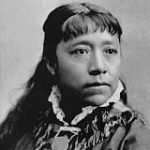 November is Native American Heritage Month, an annual recognition of the contributions of Native Americans to our national culture. In 1986, President Ronald Reagan proclaimed November 23–30 of that year “American Indian Week.” President George H. W. Bush extended the observance to a month in 1990. This year, the Library of Congress celebrates Sarah Winnemucca, born Thocmetony, or “Shell Flower,” the first Native American woman to obtain a copyright and publish in the English language. A member of the Northern Paiute Tribe, Sarah was born “somewhere near 1844,” shortly before the first encounter between the tribe and white people, as she describes in her memoir, Life Among the Piutes, Their Wrongs and Claims,
November is Native American Heritage Month, an annual recognition of the contributions of Native Americans to our national culture. In 1986, President Ronald Reagan proclaimed November 23–30 of that year “American Indian Week.” President George H. W. Bush extended the observance to a month in 1990. This year, the Library of Congress celebrates Sarah Winnemucca, born Thocmetony, or “Shell Flower,” the first Native American woman to obtain a copyright and publish in the English language. A member of the Northern Paiute Tribe, Sarah was born “somewhere near 1844,” shortly before the first encounter between the tribe and white people, as she describes in her memoir, Life Among the Piutes, Their Wrongs and Claims,
The Paiutes at first welcomed the newcomers as brothers, believing they were descendants of the origin family that, according to tradition, included four children, one pair of whom was dark and the other pair white. Sarah’s grandfather, Chief Truckee, guided John C. Frémont during his 1843-45 exploration of the Great Basin and California. Her grandfather’s acceptance of white settlers provided an opportunity for Sarah and her younger sister to be educated; Sarah became one of only a few Paiutes in Nevada able to read, write, and speak English. She was a translator for the U.S. Army and, later, for government agents at the Malheur Reservation in Oregon, designated for the Northern Paiutes through a series of executive orders issued by President U. S. Grant. Later, however, the government forced the tribe to march from Malheur to the Yakama Reservation in Washington Territory, where they endured great deprivation. Sarah began to travel through California and Nevada, speaking to white audiences on the plight of her people. In 1879, she and her father, Chief Winnemucca, went to Washington, D.C., and met with President Rutherford B. Hayes, gaining permission for the Paiutes to return to Malheur (at their own expense). That promise remained unfulfilled for years. On eventually returning to Nevada, Sarah founded a school, the Peabody Indian School, intended to promote the Paiute language and culture. It operated only briefly, until the Dawes Act of 1887, c. 119, § 4, 24 Stat. 389 (Feb. 8, 1887) (Indian General Allotment Act) required Indian children to attend English-speaking boarding schools as part of a broader federal government policy mandating assimilation of Native Americans.
Related Reading:
Native American Heritage Month (The Library of Congress, National Archives and Records Administration, National Endowment for the Humanities, National Gallery of Art, National Park Service, Smithsonian Institution, and U.S. Holocaust Memorial Museum join in paying tribute to the rich ancestry and traditions of Native Americans).
National Museum of the American Indian.
Native History: Dawes Act Signed Into Law to ‘Civilize’ Indians (Indian Country Today, Feb. 8, 2017).
United States v. Mitchell, 445 U.S. 535 (1980), app. after remand, 463 U.S. 206 (1983) (the court first held that the General Allotment Act had not imposed fiduciary duties on federal government allowing damages for mismanagement of Indian timber resources; in appeal after remand, the court found, however, that other federal statutes and regulations did gave government full responsibility to manage Indian resources and land for the Indians’ benefit).